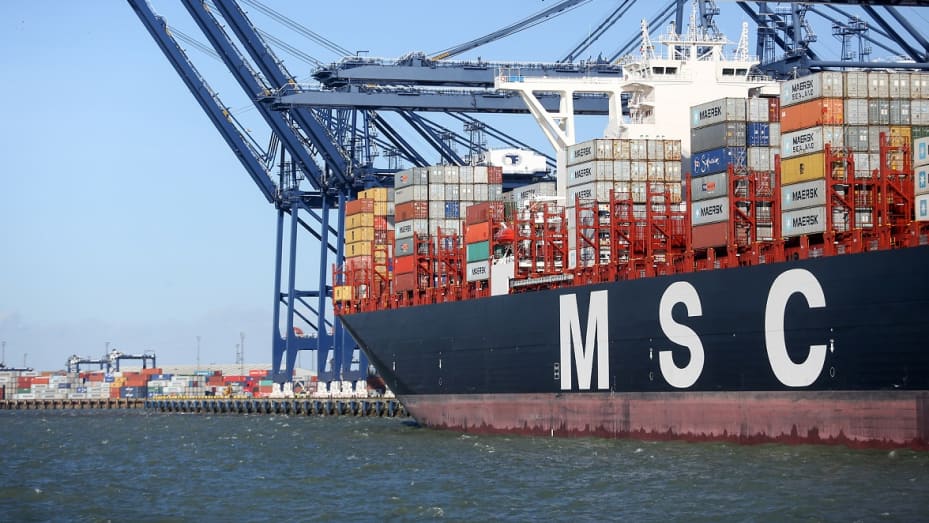MSC, Mediterranean Shipping Company, the world’s largest ocean freight line, tells CNBC it is expecting positive signals for the global economy from trade demand, but it will be months before a rebound takes hold.
Over the last several quarters, a large global demand drop and significant supply chain disruptions have influenced the market, but MSC CEO Soren Toft tells CNBC that the shipping giant is positive on the rest of the year. “I would say we are moderately optimistic that the world will resume again. I think when we come to the middle of this year, we’ll probably start seeing trade move,” Toft said. “I would suspect when we get through the second quarter and into the middle of the year, we’ll start to see some positive signs.”
The Switzerland-based shipping firm, widely seen as a barometer for global trade, has a 17.5% market share in container traffic, according to Statista.
Toft said while inventories are still too high in North America and Europe, driving down trade volumes, once inventory tapers down, freight orders will rebound.
“We still see the U.S. in very positive shape,” Toft said. “It’s a net energy exporter. … I believe they’ve been able to slowly reduce inflation, and the job market is very strong. There’s basically full employment. So we still see the U.S. as very strong and very positive.”

The Mediterranean Shipping Co. (MSC) Oscar container ship sits dockside at the Port of Felixstowe Ltd., a subsidiary of CK Hutchison Holdings Ltd., in Felixstowe, U.K.
Chris Ratcliffe | Bloomberg via Getty Images
Toft said he is also beginning to see signs of strength on the China to Europe trade route, which is a sign of consumer demand.
“The return post-Chinese New Year has been positive,” Toft said. “We’re seeing good healthy volumes now out of China to North Europe. So we believe and hope that’s a trend for the coming months.”
The latest data from China manufacturing economy showed a rebound from contraction to expansion.
SONAR FreightWaves data shows the slow pick up in global freight orders post-Chinese New Year. A pick-up in orders is normal given the pent-up demand for orders.
During the Chinese New Year, ocean carriers reduce the number of sailings out of China due to the holiday and less freight moving out of the manufacturing plants. Logistics managers told CNBC some Chinese manufacturers this year opened in stages to avoid any Covid-related closures with some welcoming workers back in early March.

Ocean freight bookings are dependent on manufacturing orders. U.S. retailers had pulled back manufacturing orders by as much as 40% due to consumer softening and warehouse inventories at historic levels. The lack of warehouse capacity is also driving rates to all-time highs, an inflationary pressure that is passed onto the consumer.
Ocean freight rates, which were the largest inflationary pressure on products, have dropped sharply back to pre-pandemic levels.
The combination of the weaker demand and soft prices has led ocean carriers to cancel sailings. By restricting the amount of sailings, shippers shrink the amount of available vessel capacity to put on a container. Rejections for ocean freight have increased, which means containers filled with product for the current or upcoming season are delayed. Logistics managers are worried this will create a bottleneck in their supply chain.
In a recent note to clients, shipping company HLS Transpacific wrote, “Carriers are now being forced to consider suspending services from Asia where demand is especially weak and the outlook shows no sign of improvement.”
But Toft said, “We are close to a normalization of the of the markets.” Though he added, “There could also be a spike up and a spike down depending on what happens with with demand.”

At a time when ocean carriers are increasingly canceling sailings because of the decrease in ocean freight orders, MSC has responded by increasing the size of its fleet.
MSC has been expanding its container fleet through a combination of newbuilt container vessels and a series of acquisitions of second-hand and charter vessels.
“MSC has spent decades building lasting relationships with a long list of satisfied customers,” said Alan Baer, CEO of OL USA. “The current strategy appears to be one wherein MSC will defend their customer base through an aggressive pricing and capacity position. Losing and regaining a customer can-be a costly and drawn out process.”
MSC recently announced the planned end of its ocean carrier alliance with Maersk, called 2M, in 2025. Maersk is investing its profits into land-based transportation and warehouse expansions. 2M, along with the other ocean alliances, have been canceling sailings in an effort to stop the drop in freight prices.
“I do not see the age of alliances as over,” Toft said. “We were happy to continue the partnership with Maersk, but Maersk wanted to go into a different trajectory and it was their right. Now, that doesn’t mean that we will not be cooperating with anybody in the future. We may choose in some routes to go on our own, and maybe in others will still do certain alliance-type structures.”
He said alliances have driven a lot of efficiencies, with significant benefits passed on to customers.
Source; CNBC


